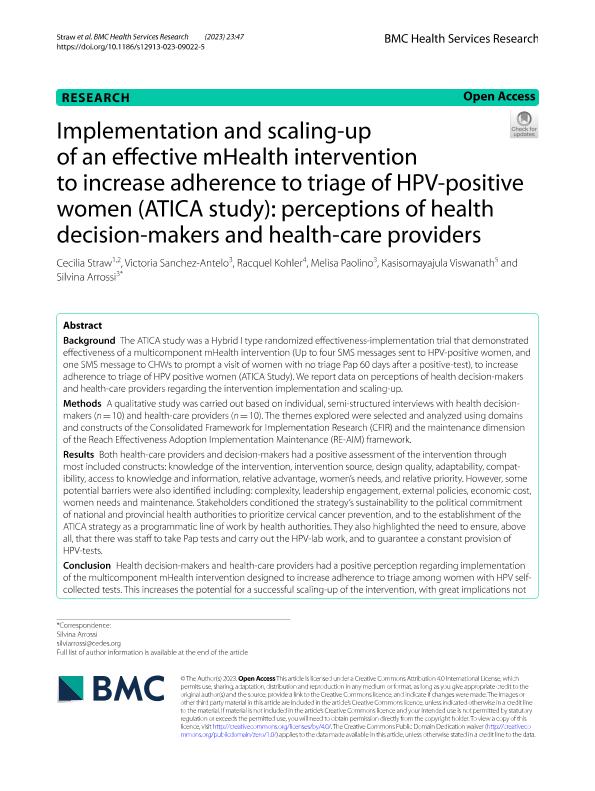Mostrar el registro sencillo del ítem
dc.contributor.author
Straw, Cecilia

dc.contributor.author
Sánchez Antelo, Victoria Inés María

dc.contributor.author
Kohler, Racquel

dc.contributor.author
Paolino, Melisa Delia

dc.contributor.author
Viswanath, Kasisomayajula

dc.contributor.author
Arrossi, Silvina

dc.date.available
2023-12-12T15:02:21Z
dc.date.issued
2023-12
dc.identifier.citation
Straw, Cecilia; Sánchez Antelo, Victoria Inés María; Kohler, Racquel; Paolino, Melisa Delia; Viswanath, Kasisomayajula; et al.; Implementation and scaling-up of an effective mHealth intervention to increase adherence to triage of HPV-positive women (ATICA study): Perceptions of health decision-makers and health-care providers; BioMed Central; Bmc Health Services Research; 23; 1; 12-2023; 1-13
dc.identifier.issn
1472-6963
dc.identifier.uri
http://hdl.handle.net/11336/220026
dc.description.abstract
Background: The ATICA study was a Hybrid I type randomized effectiveness-implementation trial that demonstrated effectiveness of a multicomponent mHealth intervention (Up to four SMS messages sent to HPV-positive women, and one SMS message to CHWs to prompt a visit of women with no triage Pap 60 days after a positive-test), to increase adherence to triage of HPV positive women (ATICA Study). We report data on perceptions of health decision-makers and health-care providers regarding the intervention implementation and scaling-up. Methods: A qualitative study was carried out based on individual, semi-structured interviews with health decision-makers (n = 10) and health-care providers (n = 10). The themes explored were selected and analyzed using domains and constructs of the Consolidated Framework for Implementation Research (CFIR) and the maintenance dimension of the Reach Effectiveness Adoption Implementation Maintenance (RE-AIM) framework. Results: Both health-care providers and decision-makers had a positive assessment of the intervention through most included constructs: knowledge of the intervention, intervention source, design quality, adaptability, compatibility, access to knowledge and information, relative advantage, women’s needs, and relative priority. However, some potential barriers were also identified including: complexity, leadership engagement, external policies, economic cost, women needs and maintenance. Stakeholders conditioned the strategy’s sustainability to the political commitment of national and provincial health authorities to prioritize cervical cancer prevention, and to the establishment of the ATICA strategy as a programmatic line of work by health authorities. They also highlighted the need to ensure, above all, that there was staff to take Pap tests and carry out the HPV-lab work, and to guarantee a constant provision of HPV-tests. Conclusion: Health decision-makers and health-care providers had a positive perception regarding implementation of the multicomponent mHealth intervention designed to increase adherence to triage among women with HPV self-collected tests. This increases the potential for a successful scaling-up of the intervention, with great implications not only for Argentina but also for middle and low-income countries considering using mHealth interventions to enhance the cervical screening/follow-up/treatment process.
dc.format
application/pdf
dc.language.iso
eng
dc.publisher
BioMed Central

dc.relation
https://ri.conicet.gov.ar/handle/11336/220015
dc.rights
info:eu-repo/semantics/openAccess
dc.rights.uri
https://creativecommons.org/licenses/by/2.5/ar/
dc.subject
ADOPTION
dc.subject
IMPLEMENTATION
dc.subject
MHEALTH
dc.subject
SCALING-UP
dc.subject
SELF-COLLECTION HPV
dc.subject.classification
Políticas y Servicios de Salud

dc.subject.classification
Ciencias de la Salud

dc.subject.classification
CIENCIAS MÉDICAS Y DE LA SALUD

dc.title
Implementation and scaling-up of an effective mHealth intervention to increase adherence to triage of HPV-positive women (ATICA study): Perceptions of health decision-makers and health-care providers
dc.type
info:eu-repo/semantics/article
dc.type
info:ar-repo/semantics/artículo
dc.type
info:eu-repo/semantics/publishedVersion
dc.date.updated
2023-12-11T17:51:30Z
dc.journal.volume
23
dc.journal.number
1
dc.journal.pagination
1-13
dc.journal.pais
Reino Unido

dc.journal.ciudad
Londres
dc.description.fil
Fil: Straw, Cecilia. Universidad de Buenos Aires; Argentina. Centro de Estudios de Estado y Sociedad; Argentina
dc.description.fil
Fil: Sánchez Antelo, Victoria Inés María. Consejo Nacional de Investigaciones Científicas y Técnicas; Argentina. Centro de Estudios de Estado y Sociedad; Argentina
dc.description.fil
Fil: Kohler, Racquel. State University of New Jersey; Estados Unidos
dc.description.fil
Fil: Paolino, Melisa Delia. Consejo Nacional de Investigaciones Científicas y Técnicas; Argentina. Centro de Estudios de Estado y Sociedad; Argentina
dc.description.fil
Fil: Viswanath, Kasisomayajula. Harvard University. Harvard School of Public Health; Estados Unidos
dc.description.fil
Fil: Arrossi, Silvina. Consejo Nacional de Investigaciones Científicas y Técnicas; Argentina. Centro de Estudios de Estado y Sociedad; Argentina
dc.journal.title
Bmc Health Services Research

dc.relation.alternativeid
info:eu-repo/semantics/altIdentifier/doi/http://dx.doi.org/10.1186/s12913-023-09022-5
dc.relation.alternativeid
info:eu-repo/semantics/altIdentifier/url/https://bmchealthservres.biomedcentral.com/articles/10.1186/s12913-023-09022-5
Archivos asociados
